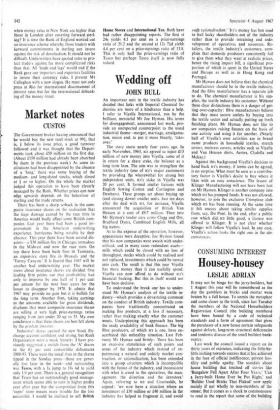Market notes
CUSTOS
The Government broker having announced that he would buy the new steel stock at 991, that is, I below its issue price, a good turnover followed and it was thought that the Depart- ments took about £50 million on the first day. (About £150 million had already been absorbed by them in the previous week.) As some in- stitutions had been disappointed by the absence of a 'long,' there was some buying of the medium- and long-dated stocks, which closed at or so higher. On the whole the market judged this operation to have been cleverly managed by the Bank. Whether prices can now edge upwards depends on the behaviour of sterling and the trade returns.
There has been a sharp setback in the com- posite insurance shares on the realisation that the huge damage caused by the race riots in America would badly affect some British com- panies. Last year there had been a good im- provement in the American underwriting experience, hurricanes being notable by their absence. This year there have been several dis- asters—a $30 million fire in Chicago, tornadoes in the Midwest and now the race riots. On top there have been bush fires in Tasmania, an expensive store fire in Brussels and the 'Torrey Canyon.' It is feared that 1967 will be another bad underwriting year. The market views about insurance shares are divided. One leading firm points out that profitability had only to improve by one half of 1 per cent per annum for the next four years for the losses to disappear by 1970. It admits that 1967 may provide no gain but it is bullish for the long term. Another firm, taking earnings as the amounts available for gross dividends, discloses that most composite insurance shares are selling at very high price-earnings ratios ranging from just under 20 up to 35. My own conclusion i. that these shares are best left alone by the prudent investor.
Industrial shares opened the new Stock Ex- change account confident and strong, but Rank Organisation were a weak feature: I have pre- viously suggested a switch from the 'A' shares to the 64 per cent convertible debentures 1988-93. There were the usual rises in the shares tipped in the Sunday press—these are gener- ally lost later in the week—and outstanding was Tesco, with a Is jump to 18s 6d to yield only 1.9 per cent. There is a general recognition that Tesco has an outstandingly good manage- ment which seems able to turn in higher profits year after year but the competition from this 'super' store means more trouble for the leis successful. I would be inclined to sell British Home Stores and International Tea. Both have had rather disappointing reports. The first at 24s yields 4.1 per cent on a price-earnings ratio of 21.2 and the second at 12s 74d yields 4.4 per cent on- a price-earnings ratio of 13.8. This is only half the price-earnings ratio of Tesco but perhaps Tesco itself is now fully valued.






























 Previous page
Previous page